Each word cloud shows the key concepts that emerged through our e-conversations from the Solutions Agenda research project, and displays these concepts by their relative strength (i.e., sized to their occurrence in the text).
Click on a word cloud to see the full-size image. Click on the conversation theme to access the full conversation.
Future of Work
 The nature and mode of 'work' has shifted, as we see trends such as growth in the non-profit sector, the building movement around producing open source products, recent rises in volunteerism, and more collective and collaborative work spaces (e.g., the HIVE in Vancouver, the Centre for Social Innovation in Toronto, and HUB Ottawa), which allow people to pursue their work focuses and interests, while still giving them access to social and intellectual capital and diverse networks. New opportunities for engaging in different work modalities and work-lives present themselves, there is increasingly less ‘business as usual’, and more integration of people’s passions, interests, lifestyles and (more critically) their social values a fundamental part of their work. The nature and mode of 'work' has shifted, as we see trends such as growth in the non-profit sector, the building movement around producing open source products, recent rises in volunteerism, and more collective and collaborative work spaces (e.g., the HIVE in Vancouver, the Centre for Social Innovation in Toronto, and HUB Ottawa), which allow people to pursue their work focuses and interests, while still giving them access to social and intellectual capital and diverse networks. New opportunities for engaging in different work modalities and work-lives present themselves, there is increasingly less ‘business as usual’, and more integration of people’s passions, interests, lifestyles and (more critically) their social values a fundamental part of their work. |
Waste
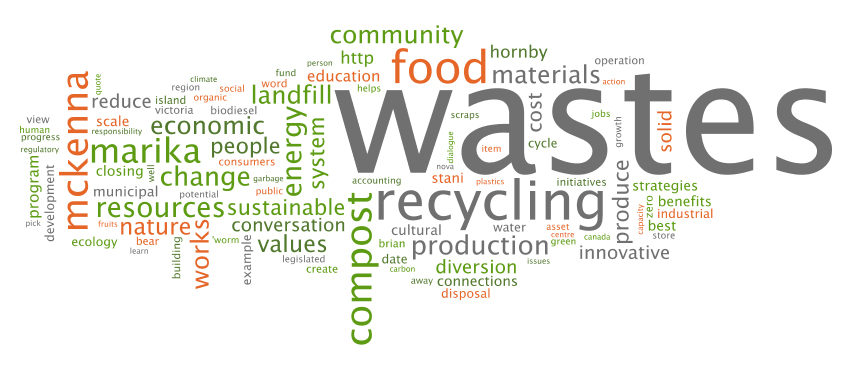 Waste does not exist in nature, with ecological systems continually recycling water, minerals and nutrients through an interplay between sunlight energy, primary producers (e.g. plants), consumers (e.g. animals) and decomposers (e.g. bacteria). Addressing our waste requires us to align with these cycles and engage in a type of production and consumption that will allow for our material outputs to return to these systems as inputs. This includes continually thinking about how to reduce the negative ecological impacts of waste in a manner that is adaptive to changes in technologies, economies and values over time. Waste does not exist in nature, with ecological systems continually recycling water, minerals and nutrients through an interplay between sunlight energy, primary producers (e.g. plants), consumers (e.g. animals) and decomposers (e.g. bacteria). Addressing our waste requires us to align with these cycles and engage in a type of production and consumption that will allow for our material outputs to return to these systems as inputs. This includes continually thinking about how to reduce the negative ecological impacts of waste in a manner that is adaptive to changes in technologies, economies and values over time. |
Rural Revitalization
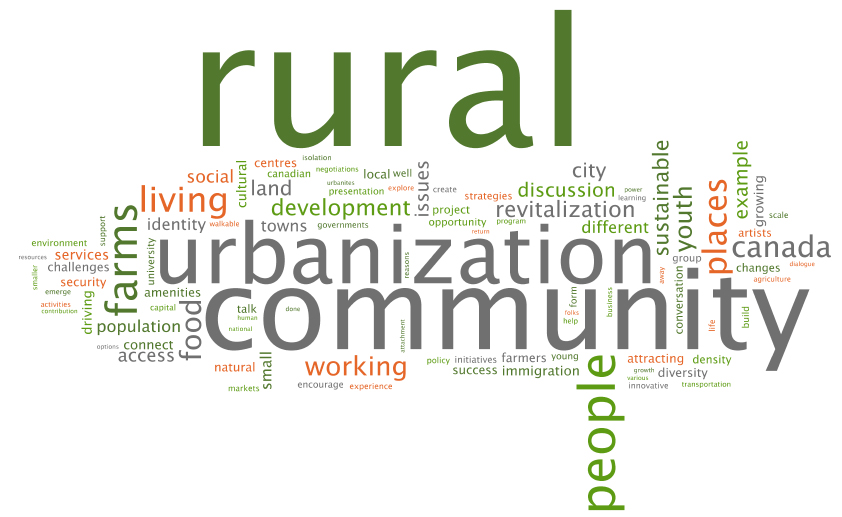 Rural spaces and communities act as the interface between human societies and the natural world, which positions them in a significant societal role. As important as rural places are to human societies, they can also be incredibly vulnerable, as the economies and identities of rural communities often develop around single-resource industries, which means their well-being can be threatened by volatile resource markets. In order to sustain rural vitality, understanding how rural communities can revitalize from periods of economic downturns and build local resilience against further exogenous shocks is essential. Rural spaces and communities act as the interface between human societies and the natural world, which positions them in a significant societal role. As important as rural places are to human societies, they can also be incredibly vulnerable, as the economies and identities of rural communities often develop around single-resource industries, which means their well-being can be threatened by volatile resource markets. In order to sustain rural vitality, understanding how rural communities can revitalize from periods of economic downturns and build local resilience against further exogenous shocks is essential. |
Mental Health
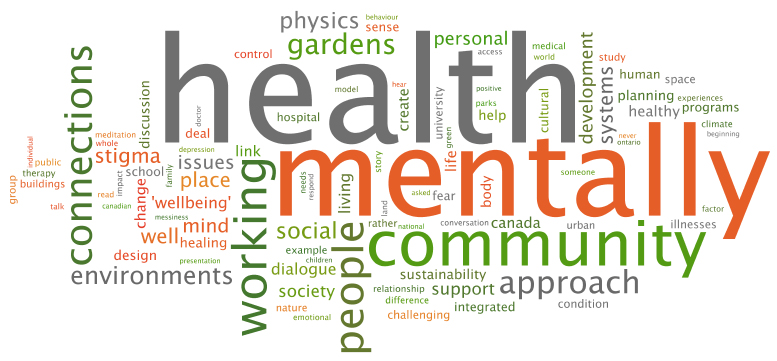 Many people attempt to suppress what they are feeling, avoiding treatment or confiding in friends and families to avoid the stigma of mental illness, so care is difficult. Why is mental health so stigmatised? Psychologist and theologian, Marcia Webb, suggests that “[a]s a society, we shy from reminders of our frailty. If persons with mental illnesses are conceptualized as separate – as invisible within, or as intruding upon – mainstream society, then mainstream society may deceive itself and imagine that mental illness does not reflect universal truths about the human condition.” Many people attempt to suppress what they are feeling, avoiding treatment or confiding in friends and families to avoid the stigma of mental illness, so care is difficult. Why is mental health so stigmatised? Psychologist and theologian, Marcia Webb, suggests that “[a]s a society, we shy from reminders of our frailty. If persons with mental illnesses are conceptualized as separate – as invisible within, or as intruding upon – mainstream society, then mainstream society may deceive itself and imagine that mental illness does not reflect universal truths about the human condition.” |
Co-operatives
 The UN declared 2012 as the International Year of the Cooperative, recognising their contribution to poverty alleviation, employment generation and social integration. For the first time, there was a common brand that co-operatives around the world embraced, and for many co-operatives, it was the first time they wore the co-operative model on their sleeves. Building on this success, the International Co-operative Alliance launched the Blueprint for a Co-operative Decade to guide the co-operative model in becoming “the acknowledged leader in economic, social and environmental sustainability; the model preferred by people and the fastest growing form of enterprise”. The UN declared 2012 as the International Year of the Cooperative, recognising their contribution to poverty alleviation, employment generation and social integration. For the first time, there was a common brand that co-operatives around the world embraced, and for many co-operatives, it was the first time they wore the co-operative model on their sleeves. Building on this success, the International Co-operative Alliance launched the Blueprint for a Co-operative Decade to guide the co-operative model in becoming “the acknowledged leader in economic, social and environmental sustainability; the model preferred by people and the fastest growing form of enterprise”. |
Multi-functional Spaces
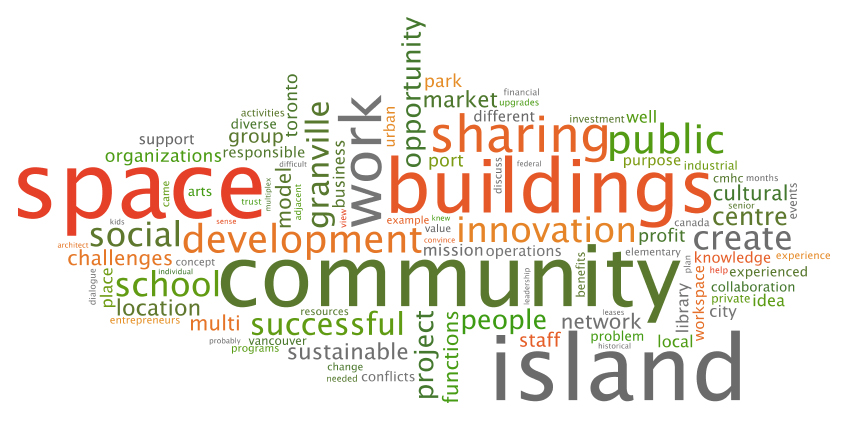 A multi-functional space can be described as a true integration of different functions in time and space. This is different from mixed-use development that compartmentalizes the various uses within a community or a landscape. For example, implementing multi-functionality within communities creates spaces that have multiple purposes. Due to their access to diverse uses in one place, these spaces can appeal to diverse community members, including activists, artists, academics and social entrepreneurs, allowing them to act as incubators for new ideas, knowledge exchange, shared experience and experimentation A multi-functional space can be described as a true integration of different functions in time and space. This is different from mixed-use development that compartmentalizes the various uses within a community or a landscape. For example, implementing multi-functionality within communities creates spaces that have multiple purposes. Due to their access to diverse uses in one place, these spaces can appeal to diverse community members, including activists, artists, academics and social entrepreneurs, allowing them to act as incubators for new ideas, knowledge exchange, shared experience and experimentation |
Energy
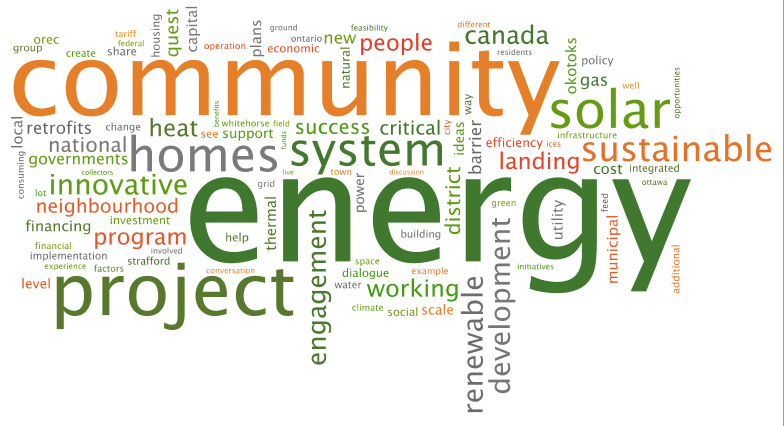 Energy is a fundamental driving force of virtually all aspects of community infrastructure, it dictates how we work, play and live. For an energy system to be sustainable, it must address each of the imperatives necessary for sustainable community development - environmental, social, and economic. Therefore, achieving sustainable energy involves a complex process of developing energy systems in a manner that minimizes environmental and health impacts, creates economic opportunity, and ensures everyone has equitable access to power. Energy is a fundamental driving force of virtually all aspects of community infrastructure, it dictates how we work, play and live. For an energy system to be sustainable, it must address each of the imperatives necessary for sustainable community development - environmental, social, and economic. Therefore, achieving sustainable energy involves a complex process of developing energy systems in a manner that minimizes environmental and health impacts, creates economic opportunity, and ensures everyone has equitable access to power. |
Food Security
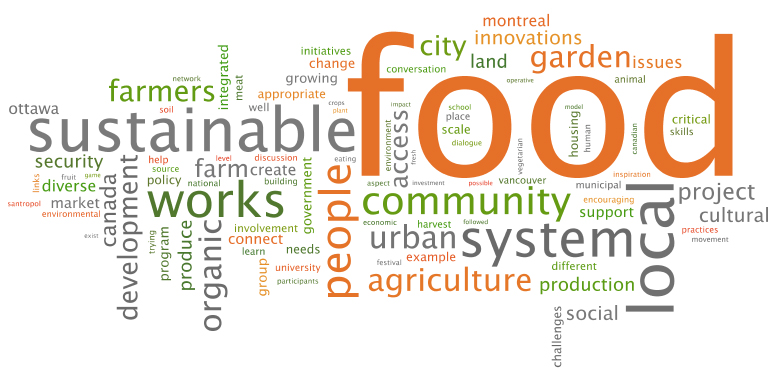 Food security is a complex sustainable development issue, that is intricately linked to health, sustainable economic development, environment, social justice and trade. Food security, as defined by the World Food Summit of 1996, exists “when all people at all times have access to sufficient, safe, nutritious food to maintain a healthy and active life”. Food security is only possible when the people who produce our food are able to earn a sustainable living wage growing, producing, processing, transporting, retailing, and serving sustainable foods. Food security is a complex sustainable development issue, that is intricately linked to health, sustainable economic development, environment, social justice and trade. Food security, as defined by the World Food Summit of 1996, exists “when all people at all times have access to sufficient, safe, nutritious food to maintain a healthy and active life”. Food security is only possible when the people who produce our food are able to earn a sustainable living wage growing, producing, processing, transporting, retailing, and serving sustainable foods. |







